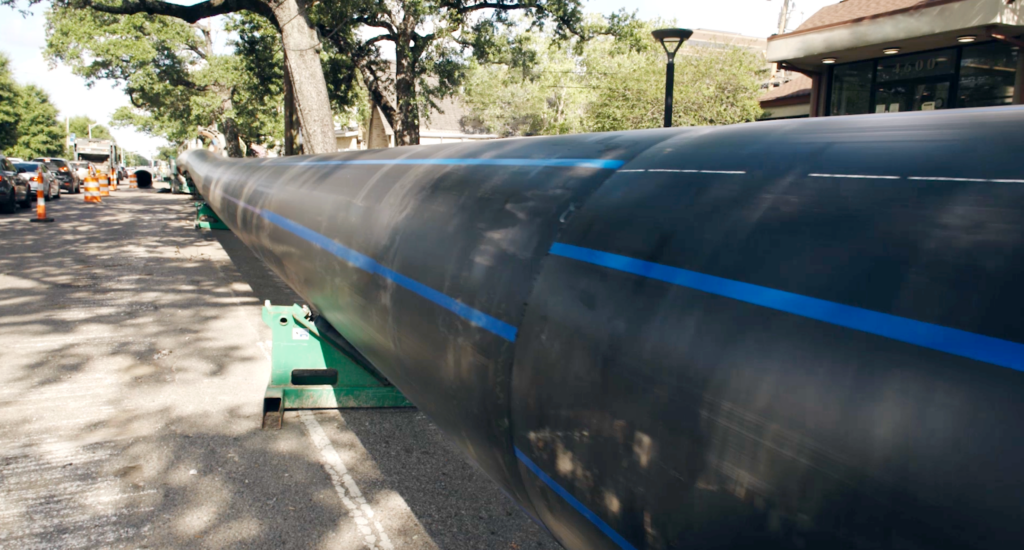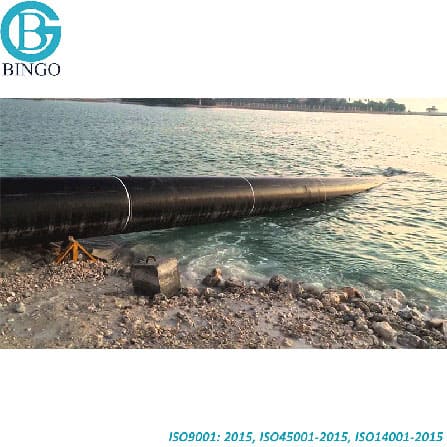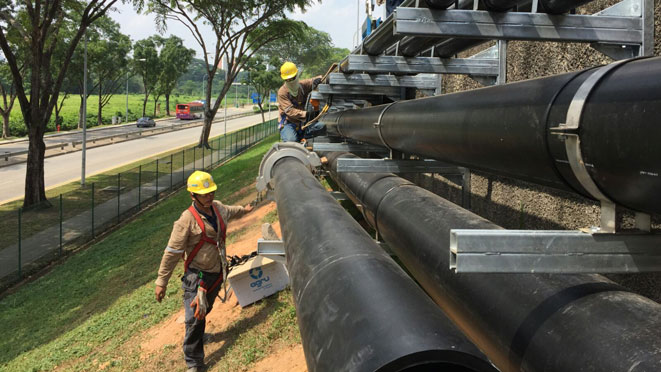Pipeline Manufacturer innovations: advanced practices shaping infrastructure
Wiki Article
Checking Out the Leading Pipeline Manufacturers: Top Quality, Dependability, and Innovation
The pipeline manufacturing sector stands at the intersection of integrity, quality, and advancement, driven by leading companies such as Tenaris and Vallourec. These manufacturers are not just committed to creating high-performance materials however are also introducing lasting techniques that deal with modern-day environmental concerns (HDPE Pipe Supplier). As we examine the requirements that define excellence in pipeline remedies, it comes to be apparent that the landscape is quickly developing. What certain developments are emerging, and just how are these improvements shaping the future of pipeline framework? The responses may redefine industry requirements in manner ins which are not yet fully comprehendedLeading Manufacturers Summary
In the domain of pipeline manufacturing, numerous principals emerge as leaders, each adding considerably to the sector's landscape. Companies such as Tenaris, Vallourec, and JFE Steel have developed themselves as frontrunners by regularly supplying high-grade products that meet rigorous market standards. Tenaris, renowned for its ingenious services, focuses on smooth and bonded pipelines, providing largely to the oil and gas market. Vallourec, a French multinational, focuses on the manufacturing of costs tubular services, emphasizing sustainability and advanced technology in its manufacturing processes.Likewise, JFE Steel, a significant Japanese manufacturer, is acknowledged for its substantial range of steel pipelines, specifically those made use of in power and framework jobs. Their commitment to r & d has enabled them to create high-performance materials that endure extreme environmental problems. Additionally, companies like united state Steel and National Oilwell Varco have increased their market visibility by expanding their item offerings and boosting operational efficiencies.
These leading producers not just control the market yet additionally drive innovation within the industry, establishing standards for top quality and dependability that gamers desire attain. Their payments are crucial for meeting the boosting demand for reliable and durable pipeline options worldwide.
Criteria for Top Quality Evaluation
Quality assessment in pipeline manufacturing depends upon 2 essential standards: product sturdiness requirements and manufacturing process performance. Making certain that materials meet extensive durability benchmarks is essential for the durability and integrity of pipelines. Additionally, maximizing the manufacturing procedure can improve efficiency while preserving top quality, eventually impacting total performance and safety and security.Product Durability Specifications
Ensuring the long life and dependability of pipeline products is important for maintaining framework stability and functional performance. Product durability requirements play an essential function in evaluating the top quality of pipes, determining the performance and lifespan of the products used in building and construction. Manufacturers should follow a series of rigorous criteria, consisting of those established by companies such as ASTM International and the American Petroleum Institute (API)These standards evaluate numerous aspects, including rust resistance, tensile stamina, and tiredness performance. For example, pipes made use of in corrosive environments call for materials that can hold up against chemical degradation, while those subjected to high-pressure problems must show extraordinary tensile stamina.
Furthermore, aspects such as temperature variations and ecological problems must be thought about, as these can significantly influence material behavior in time. Manufacturers often make use of advanced screening approaches, including sped up aging tests, to replicate long-term wear and guarantee that materials surpass or fulfill industry criteria.
Manufacturing Process Efficiency
Manufacturers' capacity to optimize producing procedure effectiveness is essential for producing premium pipelines that fulfill stringent sector standards. Effectiveness in producing straight influences expense administration, manufacturing timelines, and overall item integrity. To achieve this, leading pipeline makers implement advanced strategies such as lean manufacturing, automation, and real-time information analytics.Lean making principles are important in decreasing waste and maximizing resource utilization. By simplifying processes and getting rid of redundancies, makers can enhance efficiency while making certain consistent quality. Automation modern technologies, including robotics and computer system numerical control (CNC) machines, play an essential role in improving precision and reducing human mistake, thereby elevating the dependability of the final product.
Furthermore, making use of real-time data analytics allows producers to keep an eye on manufacturing processes continually, enabling them to identify traffic jams and make timely adjustments. This positive strategy not just improves effectiveness yet also sustains quality control procedures by guaranteeing conformity with governing criteria.
Reliability in Pipeline Solutions
Dependability in pipeline solutions is paramount, as it straight impacts the security and efficiency of fluid transport systems. Secret variables consist of the resilience of products used, adherence to rigorous screening and accreditation standards, and the consolidation of innovative material solutions that enhance performance. Understanding these aspects is important for makers intending to provide reliable pipeline facilities.Relevance of Longevity
Attaining resilience in pipeline remedies is essential, as it directly influences the long-lasting efficiency and safety of infrastructure. Sturdy pipes are essential for minimizing maintenance costs and reducing the possibility of catastrophic failings. This dependability is specifically crucial in sectors such as oil and gas, water supply, and wastewater monitoring, where the consequences of pipeline failure can be serious, both financially and environmentally.The materials and making procedures employed by pipeline manufacturers play a considerable role in figuring out the toughness of the final item. Making use of premium raw materials, advanced modern technologies, and innovative design concepts ensures that pipelines can hold up against various stressors, consisting of pressure variations, temperature level variants, and corrosive settings.
Additionally, the longevity of pipes is carefully connected to their ability to stand up to exterior aspects such as soil movement, seismic activity, and chemical exposures. Efficient deterioration protection methods, such as coverings and cathodic defense, even more improve the longevity of pipes, guarding them against deterioration with time.
Buying long lasting pipeline services inevitably translates to increased functional performance, lowered downtime, and improved safety, verifying the vital significance of sturdiness in contemporary pipeline manufacturing.
Evaluating and Certification Standards
In the domain name of pipeline solutions, extensive screening and certification requirements are vital to assure the reliability and safety and security of infrastructure. These criteria act as standards for reviewing the performance and longevity of pipeline materials and systems, validating they meet specific regulative and market requirements.Examining procedures normally encompass numerous methodologies, including pressure screening, hydrostatic analyses, and non-destructive testing techniques. These evaluations are crucial for recognizing potential weaknesses or flaws in the materials before they are deployed in real-world applications. Furthermore, certification by recognized organizations warranties that makers follow established standards, which cultivates trust fund amongst stakeholders, including service providers, end-users, and designers.
Many leading pipeline suppliers participate in continuous monitoring and improvement of their screening protocols to adjust to advancing sector standards and technical developments. Compliance with requirements such as ASTM, ASME, and ISO not just improves product dependability however likewise lessens the danger of environmental events related to pipeline failures.
Ingenious Product Solutions
The advancement of ingenious material solutions has transformed the landscape of pipeline manufacturing, enhancing both performance and toughness. Advanced materials such as high-density polyethylene (HDPE), cross-linked polyethylene (PEX), and composite products have arised as game-changers, supplying remarkable resistance to rust, temperature level fluctuations, and pressure variants. These materials not just extend the life expectancy of pipelines however additionally lower upkeep expenses, making sure reliable long-lasting performance.Moreover, producers are progressively why not check here taking on wise materials that include sensing units for real-time surveillance. This technology permits positive upkeep, considerably boosting dependability by discovering leakages or structural weak points before they rise into crucial failings. The combination of nanotechnology has likewise resulted in the development of coverings that improve the toughness of pipes against abrasion and chemical exposure.
Sustainability is one more essential focus, with manufacturers discovering bio-based compounds and recyclable materials that decrease environmental impact. As regulative standards remain to progress, the emphasis on cutting-edge product services comes to be vital in conference rigid safety and security and environmental requirements. Inevitably, these innovations not just improve the integrity of pipeline systems yet likewise add to the overall effectiveness and sustainability of energy transport frameworks.
Innovations in Pipeline Innovation
Advancements in pipeline innovation are changing the industry by improving effectiveness, security, and environmental sustainability. Recent improvements concentrate on smart pipeline systems that utilize sensing units and IoT innovation to check conditions in actual time, enabling proactive maintenance and reducing the threat of failures. These systems can identify leakages, stress modifications, and various other abnormalities, permitting quick action and reducing environmental effect.Furthermore, the growth of innovative materials, such as corrosion-resistant and composite alloys, considerably extends the life-span and reliability of pipelines. Pipeline Manufacturer (Permian Basin HDPE Pipe Supplier). These materials reduce maintenance costs and boost performance in harsh environments, making them optimal for water, gas, and oil transport
Automation and robotics are playing a vital function in pipeline construction and evaluation. Drones and robot devices facilitate studies and analyses of hard-to-reach areas, ensuring comprehensive evaluations without compromising security.
Innovative styles, such as modular pipeline systems, enable for higher flexibility in setup and alteration, providing to the vibrant needs of the energy sector. With each other, these technological improvements not just boost operational performance yet also add to a much more sustainable and resistant pipeline facilities, leading the way for a greener future.
Study of Success
Throughout numerous fields, successful applications of advanced pipeline innovations demonstrate substantial enhancements in operational performance and safety and security. One noteworthy instance is the implementation of wise pipeline tracking systems in the oil and gas industry, where real-time information analytics have actually reduced leakage discovery times by over 50%. This not only reduces ecological dangers however additionally improves the overall stability of pipeline framework.
Additionally, a significant manufacturer applied robot inspection innovations in its pipeline maintenance operations, resulting in a 40% enhancement in inspection performance. This method has structured upkeep timetables and significantly minimized downtime.
These study highlight just how leading pipeline manufacturers are leveraging advanced modern technologies to cultivate dependability and functional quality, ultimately establishing brand-new criteria for the industry. As these successes remain to unravel, they lead the way for additional developments in pipeline manufacturing and monitoring.

Environmental Sustainability Practices
Frequently, pipeline suppliers are focusing on ecological sustainability practices to minimize their ecological footprint and boost the longevity of their items. This commitment is reflected in different initiatives intended at minimizing waste, conserving energy, and utilizing sustainable products throughout the manufacturing procedure.
Many makers are taking on innovative modern technologies that decrease emissions and power intake. For circumstances, the integration of automated systems and energy-efficient machinery aids streamline manufacturing while lowering reliance on fossil gas. Additionally, business are progressively turning to eco-friendly products, such as recycled steels and bioplastics, which not just decrease the ecological effect but additionally promote a round economy.
Moreover, pipeline makers are carrying out strenuous lifecycle analyses to review the environmental ramifications of their products from beginning to disposal. This approach enables them to determine possibilities for renovation and foster accountable sourcing and waste management practices.
Collaboration with environmental organizations additionally improves these initiatives, as makers look for to straighten their operations with global sustainability objectives. Ultimately, these environmental sustainability practices not just add to a healthier earth yet likewise placement makers as liable leaders in the market, interesting ecologically aware stakeholders and consumers alike.
Future Patterns in Pipeline Manufacturing
As the need for much more efficient and sustainable framework grows, pipeline manufacturing is poised for considerable advancements that will reshape the industry. Trick patterns expected in the coming years consist of the integration of advanced products, such as corrosion-resistant and composite alloys, which enhance longevity while lessening environmental impact. Manufacturers are likewise expected to adopt innovative manufacturing methods, like additive manufacturing and automation, to streamline procedures, lower waste, and reduced expenses.The surge of wise pipeline technologies, including sensors and IoT tools, will certainly allow real-time tracking and anticipating maintenance, therefore enhancing safety and security and operational performance. This electronic change will certainly not only enhance source monitoring however additionally assist in compliance with rigid ecological guidelines.
Sustainability will stay a main focus, driving makers to purchase eco-friendly practices, consisting of energy-efficient manufacturing methods and reusing efforts. As the international emphasis on environment change intensifies, pipeline manufacturers will require to adapt by establishing solutions that satisfy both ecological and financial needs.
Frequently Asked Concerns

What Industries Mostly Use Pipeline Products From These Manufacturers?
Pipeline items are mainly utilized in sectors such as oil and water, wastewater and gas management, chemical mining, building, and handling. These sectors rely upon efficient, durable, and secure transport of liquids and products.
Just How Do Manufacturers Make Certain Conformity With International Pipeline Specifications?
Manufacturers assure conformity with worldwide pipeline criteria by implementing strenuous quality assurance processes, carrying out normal evaluations, sticking to well-known regulatory structures, and buying staff member training to advertise recognition and understanding of safety and high quality needs.What Is the Typical Lifespan of Pipelines From Leading Manufacturers?
The average life expectancy of pipelines from leading manufacturers generally ranges from 30 to 100 years, relying on product, environmental problems, and upkeep practices. Permian Basin HDPE Pipe Supplier. Routine assessments and adherence to sector criteria markedly affect longevity and efficiencyExist Certifications Certain to Pipeline Manufacturing High Quality?
Yes, different accreditations exist for pipeline manufacturing top quality, consisting of ISO 9001 for high quality administration systems and API criteria certain to pipelines. These accreditations ensure adherence to strenuous safety and security, performance, and ecological criteria within the industry.Exactly How Do Manufacturers Handle Pipeline Maintenance and Services?
Manufacturers normally carry out an aggressive maintenance strategy that includes regular inspections, checking systems for early discovery of issues, and a structured repair service method. This method guarantees pipeline honesty, minimizes downtime, and boosts overall operational performance.Quality analysis in pipeline manufacturing hinges on 2 critical requirements: product sturdiness standards and making process effectiveness - HDPE Pipe Supplier. Product durability criteria play a crucial role in evaluating the high quality of pipes, dictating the performance and life-span of the materials utilized in building. The products and manufacturing processes used by pipeline producers play a significant function in establishing the sturdiness of the final product. The ordinary life expectancy of pipes from leading producers normally ranges from 30 to 100 years, depending on product, ecological problems, and upkeep practices. Yes, different accreditations exist for pipeline making quality, including ISO 9001 for quality monitoring systems and API standards particular to pipes
Report this wiki page